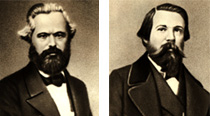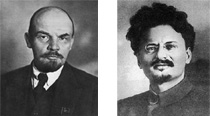The article below may be copied and circulated but proper attribution of authorship is required.
Stalin versus USSR
Copyright: Iskra Research; By: F. Kreisel; July 5, 1994
Dear readers, in view of Jonathan Jaynes: "…had it not been for Stalin and his policies of collectivization and rapid industrialization the Soviet Union would not have been prepared to fight the Nazis. … Stalin knew far in advance that a world war was not far in the future and did all he could to stall the fighting untill the Soviets were prepared both militarily and industrially to support such a war effort".
This view verges on historical revisionism.
The first to fight against Stalin were the Trotskyists and the Left Opposition in 1923. The question then was one of historic perspectives: socialism in one country or a world revolution. Stalin was supported by the world bourgeoisie against the "fanatical lefts". The United States, for example, only recognized the USSR diplomatically in 1934, having ascertained that the Soviet regime no longer stood for world socialist revolution.
The economic policies of the Soviet bureaucracy, which Stalin represented, were characterised by eclectic zigzags and wild swings which negated and diminished the positive benefits of nationalised economy and central planning. Until 1928, Stalin supported the Kulaks and the NEPmen against the Left Opposition which demanded a policy of heavier taxation and planned industrialisation. Then, after imprisoning and silencing the left wing proponents of planned industrialisation, Stalin was forced to make a wild and unplanned swing to the left and unleashed a virtual civil war in the countryside. Forced collectivisation was extremely destructive to Soviet agriculture: millions of peasants died or were exiled to Siberia; mass slaughter of horses, cows, sheep, fowl, etc. condemned the Soviet masses to years of rationing and privation.
The political terror of Stalin's GPU in the 1930's wiped out the cream of the Soviet intelligentsia; scientific, political, military, artistic and cultural life was reduced to crass conformism. Stalinists reduced Marxism to a dogma and outlawed whole branches of science (genetics, cybernetics) if these collided with the immediate needs of this privileged and ever more corrupt elite. The bloody Purges of 1936 — 39 wiped out the whole generation which led the October Revolution. The aftereffect of this genocide of communists and socialists is felt to this day: the social consciousness of the Soviet masses was stripped of its socialist and Marxist content.
Stalin weakened the USSR militarily. The policies of forced collectivisation and the Ukrainian Famine of 1932-33 alienated large sections of the population, including the rank and file soldiers, from the regime. The execution of the majority of Red Army officers during the Great Purges in 1936-39 destroyed the fighting capacity of the army. Stalin harmed the military industry by jailing and executing leading designers and engineers. Stalin propped up the German economy on the eve of Hitler's attack by selling him grain, oil and strategic metals; he demoralized and disoriented the Red Army by denying all evidence of Germany's armed build-up in 1941.
On the international scale, Stalinism was a prop of imperialist status quo. Its policies of "Third period" and "social-fascism" (left zigzag) led to the victory of Hitler in Germany. Stalin's policy of Peoples' Fronts (right zigzag) led to the defeat of the Spanish revolution and the derailing of the possible French socialist revolution in 1936-37. Stalin's 1939 Pact with Hitler and their cooperation in the division of Poland demoralized the world working class. Even advanced workers began to think that there was no principled difference between Communism and imperialism.
At the end of World War II, Stalin made an agreement with imperialism: he would prop up the reestablishment of capitalism in Western Europe and of colonialism in Africa and Asia; the imperialists would let Stalinist bureaucracy extend its empire into Eastern and Central Europe. This agreement divided up the European working class and prolonged capitalism.
Now, Stalinism has completed its counterrevolution by presiding over the restoration of capitalism in the USSR and the other Stalinist states. The greatest crime of Stalinism is that it destroyed the appeal of socialism in the eyes of the working class. The only way to make socialist program live for the workers, is to expose Stalin and Stalinism for what they really are — the counterrevolutionary agency of imperialism.




